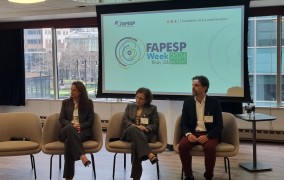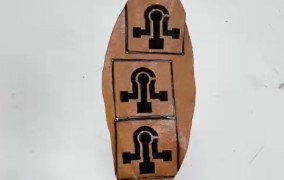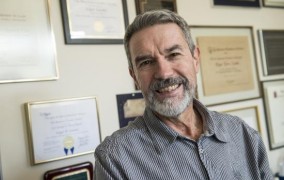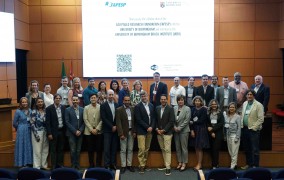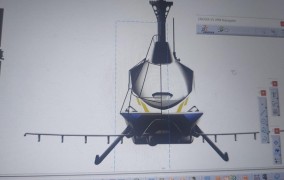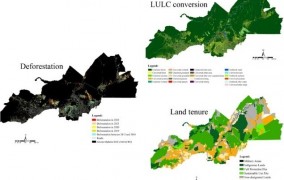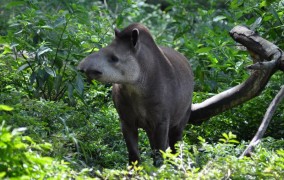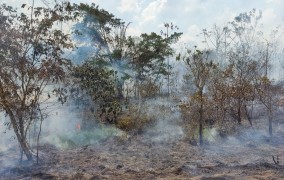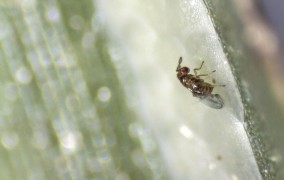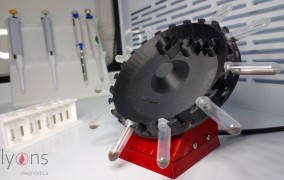
News
-
Chapter 3: On the Preto River, poraquês live in submerged ‘condominiums’ on the banks of igarapés
2024-06-07A species from the Negro River basin uses the spaces between the roots and hollows of trees to build nests and care for its young for four to six months, leaving only at night to hunt. -
Chapter 4: Sarapós stand out for the diversity of environments they occupy
2024-06-07The most abundant electric fish are found from the bottom of large rivers to igarapés, where they can bury themselves in the sand or blend into the leaf litter. In two weeks, an expedition in the Negro River basin collected 27 species of the group. -
Chapter 5: An accident with a ray doesn’t slow the pace of the collections at Jauaperi
2024-06-07The low severity of the injury, rapid medical attention and appropriate care meant that the researcher was able to return to work on the same day he was stung by a venomous fish. In the Amazon, cases often get worse because a lack of specialized care. -
Chapter 6: Trip to the Negro River marked a reunion after pioneering expeditions in the 1990s
2024-06-07One of the fishing methods used to collect electric fish in the DEGy Negro River Expedition was employed for the first time on a large scale in freshwater during the Calhamazon project, which brought together researchers from Brazil and the United States between 1993 and 1996. -
Chapter 7: Expedition ends with more than 130 species of fish collected
2024-06-07The last episode of the series of reports takes stock of the journey of a group of researchers from the USP Museum of Zoology, who spent two weeks traveling along the Negro, Preto and Jauaperi rivers in the states of Amazonas and Roraima. -
Virus that causes COVID-19 can remain in sperm for 110 days after infection
2024-06-05Researchers detected SARS-CoV-2 in male reproductive cells under the microscope even when PCR testing failed to detect the virus in semen. The discovery serves as a warning of possible implications for natural conception and particularly for assisted reproduction. -
Researchers discover neural circuit involved in compulsive eating even without hunger
2024-06-05In a study involving mice, scientists used a technique that combines light stimulation and bioengineering to activate a cluster of nerve cells deep inside the brain. The discovery could pave the way to future treatment of eating disorders. -
Frequency and magnitude of extreme rainfall events in Brazil’s South region have increased since 1950, study shows
2024-06-05An analysis of data from weather stations shows that large contiguous areas of the region have seen more days of extremely heavy rain in the past seven decades. -
Scientists in Brazil and India collaborate on research to create promising treatment for solid tumors
2024-06-05In tests involving animals, nanoparticles containing substances already approved for human use reduced inflammation in the biological microenvironment where malignant tumors flourish and facilitated the action of the immune system. -
Yucatán meteorite and Andes uplift helped shape the ecosystems of South America
2024-06-05In the fourth 2024 FAPESP Lecture, Carlos Jaramillo, a Colombian geologist, palynologist and paleobiologist affiliated with the Smithsonian Tropical Research Institute (STRI) in Panama, showed how South America’s landscapes and biomes have evolved over geological time. -
A Brazilian solution to help basic industries manage refractory linings
2024-06-05A startup supported by FAPESP is developing a system to assure the proper use of elements capable of guaranteeing structural integrity at high temperatures while reducing heat transfer from machinery and equipment to the environment. -
Dogs and cats teach ethology, the science of animal behavior, to elementary school students
2024-06-05Extension project developed by students aged 8 to 15 at the House of Science of the Blood Center run by the University of São Paulo in Ribeirão Preto. -
Molecule produced in gut can have protective effect against flu, study shows
2024-06-03In experiments with mice, researchers at the State University of Campinas (UNICAMP) in Brazil and the Pasteur Institute in Lille (France) found that viral load and inflammation decreased in animals infected by influenza virus when they were given the substance. -
Fight against obesity goes far beyond individual struggle to change lifestyle, scientists say
2024-05-29In an article published in Nature Metabolism, researchers based in Brazil and Mexico analyze the Latin American obesity epidemic from a broad perspective that includes socioeconomic, cultural and epigenetic factors. For the authors, solutions must focus on collective action rather than individualization of the problem. -
Research optimizes biological control of pest that severely damages soybean crops
2024-05-29Scientists at São Paulo State University (UNESP) and Oklahoma State University (OSU) verified in the field that a parasitoid wasp that neutralizes the Brown stink bug should ideally be released at intervals of 30 m. -
Choice of best medication for cancer treatment can be facilitated by predictive testing
2024-05-29A startup supported by FAPESP is developing a methodology that will give oncologists more precise information to help them choose the best therapeutic approach. -
Center for Research on Biodiversity Dynamics and Climate Change is launched in Rio Claro
2024-05-29The first Research, Innovation and Dissemination Center (RIDC) hosted by São Paulo State University (UNESP) will promote innovation focusing on sustainable solutions and accelerated knowledge dissemination. -
Novel material shows potential to produce green hydrogen
2024-05-29A study supported by FAPESP produced films comprising polyaniline nanostructures with a carbon nanotube underlayer. -
FAPESP and France’s National Institute of Research on Agriculture and Environment plan cooperation agreement
2024-05-29A delegation from INRAE visited FAPESP to discuss common areas of interest in scientific collaboration. -
University of São Paulo presents seven new research centers directly linked to the Rector’s Office
2024-05-29Today’s key issues, such as artificial intelligence, climate change, cancer and Brazilian institutions, will be the focus of inter-institutional and multidisciplinary teaching and research; the new organization gives groups more autonomy and agility. -
Drought in the Cerrado (Neotropical savanna) is the worst for at least seven centuries, study shows
2024-05-22Chemical analysis of stalagmites in the Peruaçu Caves National Park showed that global warming has disrupted the hydrological cycle in Brazil’s central region, making a significant proportion of any rain that falls evaporate before it can penetrate the soil. -
Jaboticaba peel reduces inflammation and controls blood sugar in people with metabolic syndrome
2024-05-22In a study with 49 participants, researchers at the State University of Campinas found that daily consumption of a dietary supplement containing 15 g of the substance for five weeks improved glucose metabolism even after meals. -
A portable sensor for self-testing of urine to detect markers of diseases such as cancer, gout and Parkinson’s
2024-05-22Developed by Brazilian scientists, the device connects wirelessly to a smartphone and can be used to monitor general health. -
Brazilian scientists are set to look for vestiges of the last Neanderthals in Romania
2024-05-22The mission, which will be led by archeologist and anthropologist Walter Neves, aims to understand how the Neanderthals interacted with Homo sapiens, and why they disappeared. -
Novel technique can improve quality of animal embryos produced in vitro
2024-05-22Researchers at a startup supported by FAPESP have developed a material that mimics conditions in the uterus and could result in a 32% rise in bovine embryo production. -
FAPESP, São Paulo State Government and German university THI sign cooperation agreement
2024-05-22The aim is to fund bilateral projects in the field of artificial intelligence, focusing on mobility, energy and security. -
Inflammation during pregnancy can cause cleft lip in individuals with a genetic predisposition
2024-05-22Through experiments with human cells and animals, researchers from the University of São Paulo and collaborators have shown how gene-environment interactions during the craniofacial development of the embryo can lead to malformations. -
Proteins modified in lungs offer clues to biological functions of bromine
2024-05-22Researchers at a FAPESP-supported research center showed that the addition of bromine to extracellular matrix proteins is a physiological modification dependent on the enzyme peroxidasin – the study extends knowledge of the scope of this enzyme’s activity in the mammalian organism. -
Aerobic exercise performed in the evening benefits elderly hypertensives more than morning exercise
2024-05-15A study conducted at the University of São Paulo with 23 volunteers found that only evening training regulated baroreflex sensitivity, a mechanism that compensates for abrupt changes in blood pressure. -
Bruxism is frequently observed in patients with post-traumatic stress disorder
2024-05-15This study was conducted at the University of São Paulo and published in Clinical Oral Investigations; the authors emphasize the importance of collaboration between dentists and psychiatrists to improve diagnosis and treatment. -
Plasma treatment of semiconductor films can improve hydrogen production
2024-05-15In an experiment resulting from collaboration between two FAPESP-supported research centers, a material was modified for use in solar-driven water splitting to produce hydrogen. -
A startup supported by FAPESP is conducting one of the largest studies on Huntington’s disease
2024-05-15BioDecision has developed a methodology that combines RNA sequencing and big data to offer the pharmaceutical industry molecular targets of interest for treatment of the disease. -
Researchers conduct first-ever study to characterize microbiota in saliva of weaned piglets on commercial farms in Brazil
2024-05-15Results show that oral fluid bacteria differ from fecal and environmental bacteria. Identification of these microorganisms can help diagnose infectious diseases and improve pork production. -
São Paulo School of Advanced Science presents innovative approach to environmental issues
2024-05-15Focus on transdisciplinarity aims to foster participation by all stakeholders in efforts to address global change. The subject was front and center at an event held in April 2024 at a historic town in São Paulo state. -
World experts create document on AI capabilities and risks
2024-05-15Director of the Institute of Mathematical and Computer Sciences at the University of São Paulo collaborates with work developed in the UK to guide governments. -
RCGI joins Shell’s energy transition center in the Netherlands
2024-05-15The new office is expected to serve as a research hub for the Research Center for Greenhouse Gas Innovation in Europe, fostering international partnerships. -
In a reservoir in Southeast Brazil, introduction of a fish native to the Amazon has reduced native species diversity
2024-05-13Since 2001, when it was first recorded in the Jaguarai reservoir in São Paulo state, the Silver croaker (Plagioscion squamosissimus) has established and increased its population in the Paraíba do Sul Basin to the detriment of native fish species. -
Cocaine is an emerging contaminant of concern in the Bay of Santos (Brazil), says researcher
2024-05-08The drug accumulates not only in water, but also in sediments and marine organisms, and poses a high ecological risk, said Camilo Seabra, a professor at the Federal University of São Paulo, during FAPESP Week Illinois. -
Laser printing on fallen tree leaves produces sensors for medical and laboratory use
2024-05-08Leaf cellulose is converted by pyrolysis to graphite, which is printed in the right shape for the surface to function as a sensor. Tests to determine concentrations of dopamine and paracetamol confirmed that the sensor performed successfully. -
Almost 30% of children and adolescents experience pain in muscles, bones or ligaments, study shows
2024-05-08A survey conducted in Brazil provides an overview of musculoskeletal pain in the very young. Back pain and leg pain were the most frequent complaints among 2,688 volunteers aged 12 on average. -
Third 2024 FAPESP Lecture discusses training of physician-scientists in the United States
2024-05-08The lecture was delivered by Antonio Bianco, a professor of medicine at the University of Chicago who has won several awards for research in the thyroid field. -
Brazilian researcher receives one of the most important awards in the field of glass materials
2024-05-08Edgar Dutra Zanotto, coordinator of the Center for Teaching, Research and Innovation in Glass, was invited by the American Ceramic Society to give the Varshneya Frontiers of Glass Science Lecture. -
Study focusing on primary care seeks to improve diagnosis and management of chronic obstructive pulmonary disease
2024-05-08The project, conducted by researchers affiliated with the University of São Paulo in Brazil and the University of Birmingham in the UK, was one of 15 presented at an event held to celebrate the partnership between the British institution and FAPESP. It also marked the launch of the University of Birmingham Brazil Institute, whose mission is to bolster UK-Brazil research collaboration. -
Brazilian startup designs self-flying aerial vehicle for crop spraying
2024-05-08The firm is supported by FAPESP and is developing an autonomous helicopter capable of spraying crops on steep hillsides. -
Educational game raises awareness among young people about measures to combat dengue fever
2024-05-08Game challenges the player to find and eliminate all Aedes aegypti mosquito hotspots. -
In Brazil, 76% of deforestation in three Amazonian states occurred in a planned agricultural development zone
2024-05-06The researchers showed that pressure has intensified since the 2018 announcement of a plan to create a development zone where the states of Amazonas, Acre and Rondônia meet. -
Loss of large herbivores affects interactions between plants and their natural enemies, study shows
2024-05-06Researchers in Brazil compared leaf damage caused by insects and pathogens in areas with and without the presence of mammals such as tapirs, deer and peccaries. Absence of the animals led to loss of microorganisms that cause leaf disease, potentially affecting long-term eco-evolutionary processes and reducing biodiversity in tropical forests. -
Wildfires in old-growth Amazon forest areas rose 152% in 2023, study shows
2024-05-01The increase was confirmed by an analysis of satellite images, contrasting with a drop in deforestation and the total number of fires detected in the Amazon. The Brazilian government’s center for forest fire prevention says it is partnering with other institutions to combat wildfires in the region. -
Registration of biological pest control products exceeds that of agrochemicals in Brazil
2024-05-01Around 90% of the sugarcane area in Brazil now uses natural enemies to combat agricultural pests; data were presented during FAPESP Week Illinois. -
Test will permit relatively non-invasive detection of micrometastasis
2024-05-01A Brazilian startup supported by FAPESP is developing a solution to detect a biomolecule linked to the presence of migratory oral cancer cells.
Most popular
-
Parents’ alcohol and drug use influences their children’s consumption, research shows
2026-02-13
-
Impact-formed glass evidence of cosmic collision in Brazil about 6 million years ago
2026-02-18
-
Second spider-parasitic mite described in Brazil
2026-01-05
-
Study reveals protein linked to spread of pancreatic cancer through nerves
2026-01-14
-
Babies exposed to poverty show delays in motor development as early as six months
2026-03-02
-
Study warns of nutritional risks of prolonged use of the drug omeprazole
2026-02-04
-
The ‘yo-yo effect’ impairs metabolism and reduces brown fat activity in women
2026-02-02
-
Research shows how immune system reacts to pig kidney transplants in living patients
2026-01-08
-
Artificial saliva containing sugarcane protein helps protect the teeth of patients with head and neck cancer
2026-01-07
-
Brazilian research reveals how some types of breast cancer ‘evade’ treatment
2026-01-21










































